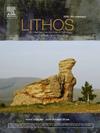Magmatic differentiation of peralkaline granites: Constraints from iron isotope fractionation between Fe-bearing minerals
IF 2.9
2区 地球科学
Q2 GEOCHEMISTRY & GEOPHYSICS
引用次数: 0
Abstract
Iron isotopes have been found useful in tracing magmatic processes of calc-alkaline granitic magmas, but its application in peralkaline granitic systems is hampered by the lack of information regarding the Fe isotope fractionation factors between alkali-rich ferromagnesian silicate minerals and Fe![]() Ti oxides. To better understand the behavior of Fe isotopes during peralkaline magma differentiation, we carried out high-precision Fe isotope analyses on peralkaline and associated metaluminous high-silica granite rocks and Fe-bearing minerals separated from the rocks in Zhoushan archipelago, southeast China. The Fe-bearing mineral show a large dispersion in Fe isotope compositions, with δ56Fe ranging from 0.03 ‰ to 0.70 ‰, following the sequence of K-feldspar ≥ magnetite > aegirine > arfvedsonite > ilmenite. The δ56Fe differences between the mineral pairs are relatively consistent. Based on the magmatic temperatures defined by quartz-zircon oxygen isotopic geothermometer, the temperature-dependent equilibrium Fe isotope fractionation functions between following mineral pairs are obtained: Δ56Feaegirine-arfvedsonite = 0.20 (± 0.07) × 106/T2, Δ56Femagnetite-arfvedsonite = 0.38 (± 0.06) × 106/T2, and Δ56Femagnetite-aegirine = 0.16 (± 0.04) × 106/T2. The bulk peralkaline granites have variable but generally high δ56Fe values ranging from 0.28 ± 0.03 ‰ to 0.62 ± 0.04 ‰, with a mean of 0.42 ± 0.09 ‰ (1SD), which are higher than those of the associated metaluminous granitic samples (δ56Fe = 0.22 ± 0.05 ‰, 1SD). Furthermore, δ56Fe values of the peralkaline granites are negatively correlated with Sm/Yb and MnO, consistent with removal of isotopically light Fe-enriched arfvedsonite, implying that peralkaline granites experienced extensive magma differentiation regardless whether they were derived from differentiation of mantle-derived basaltic melts or partial melting of curst sources. Our results highlight a large Fe isotope fractionation between alkali ferromagnesian silicates and oxides, confirming Fe isotopes as a potential tool in tracking the differentiation processes of peralkaline magmas.
Ti oxides. To better understand the behavior of Fe isotopes during peralkaline magma differentiation, we carried out high-precision Fe isotope analyses on peralkaline and associated metaluminous high-silica granite rocks and Fe-bearing minerals separated from the rocks in Zhoushan archipelago, southeast China. The Fe-bearing mineral show a large dispersion in Fe isotope compositions, with δ56Fe ranging from 0.03 ‰ to 0.70 ‰, following the sequence of K-feldspar ≥ magnetite > aegirine > arfvedsonite > ilmenite. The δ56Fe differences between the mineral pairs are relatively consistent. Based on the magmatic temperatures defined by quartz-zircon oxygen isotopic geothermometer, the temperature-dependent equilibrium Fe isotope fractionation functions between following mineral pairs are obtained: Δ56Feaegirine-arfvedsonite = 0.20 (± 0.07) × 106/T2, Δ56Femagnetite-arfvedsonite = 0.38 (± 0.06) × 106/T2, and Δ56Femagnetite-aegirine = 0.16 (± 0.04) × 106/T2. The bulk peralkaline granites have variable but generally high δ56Fe values ranging from 0.28 ± 0.03 ‰ to 0.62 ± 0.04 ‰, with a mean of 0.42 ± 0.09 ‰ (1SD), which are higher than those of the associated metaluminous granitic samples (δ56Fe = 0.22 ± 0.05 ‰, 1SD). Furthermore, δ56Fe values of the peralkaline granites are negatively correlated with Sm/Yb and MnO, consistent with removal of isotopically light Fe-enriched arfvedsonite, implying that peralkaline granites experienced extensive magma differentiation regardless whether they were derived from differentiation of mantle-derived basaltic melts or partial melting of curst sources. Our results highlight a large Fe isotope fractionation between alkali ferromagnesian silicates and oxides, confirming Fe isotopes as a potential tool in tracking the differentiation processes of peralkaline magmas.
碱性花岗岩的岩浆分异:含铁矿物间铁同位素分馏的制约因素
铁同位素被认为有助于追踪钙碱性花岗岩岩浆的岩浆过程,但由于缺乏有关富碱铁镁硅酸盐矿物与铁钛氧化物之间铁同位素分馏因子的信息,铁同位素在围岩花岗岩体系中的应用受到了阻碍。为了更好地了解围岩岩浆分异过程中铁同位素的行为,我们对中国东南部舟山群岛的围岩和伴生金属铝高硅花岗岩岩石以及从岩石中分离出来的含铁矿物进行了高精度的铁同位素分析。含铁矿物的铁同位素组成呈现出较大的分散性,δ56Fe从0.03‰到0.70‰不等,按照K长石≥磁铁矿>egirine>arfvedsonite>钛铁矿的顺序排列。矿物对之间的δ56Fe差异相对一致。根据石英-锆石氧同位素地温计确定的岩浆温度,可以得到以下矿物对之间与温度相关的平衡铁同位素分馏函数:Δ56Feaegirine-arfvedsonite = 0.20 (± 0.07) × 106/T2,Δ56Femagnetite-arfvedsonite = 0.38 (± 0.06) × 106/T2,Δ56Femagnetite-aegirine = 0.16 (± 0.04) × 106/T2。大块围岩花岗岩的δ56Fe值从0.28±0.03‰到0.62±0.04‰不等,平均值为0.42±0.09‰(1SD),但普遍较高,高于相关的金属铝质花岗岩样品(δ56Fe = 0.22 ± 0.05 ‰,1SD)。此外,碱性花岗岩的δ56Fe值与Sm/Yb和MnO呈负相关,这与富含同位素轻Fe的阿费维德松石被移除是一致的,这意味着碱性花岗岩经历了广泛的岩浆分异,无论它们是来自地幔玄武岩熔体的分异,还是来自凝灰岩源的部分熔融。我们的研究结果突显了碱性铁镁硅酸盐和氧化物之间存在着巨大的铁同位素分馏,证实了铁同位素是追踪围岩岩浆分异过程的潜在工具。
本文章由计算机程序翻译,如有差异,请以英文原文为准。
求助全文
约1分钟内获得全文
求助全文
来源期刊

Lithos
地学-地球化学与地球物理
CiteScore
6.80
自引率
11.40%
发文量
286
审稿时长
3.5 months
期刊介绍:
Lithos publishes original research papers on the petrology, geochemistry and petrogenesis of igneous and metamorphic rocks. Papers on mineralogy/mineral physics related to petrology and petrogenetic problems are also welcomed.
 求助内容:
求助内容: 应助结果提醒方式:
应助结果提醒方式:


